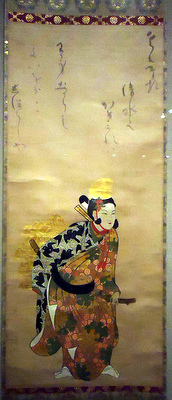- Japanese: 白拍子 (shirabyoushi)
Shirabyôshi were court dancers of the Heian and early Kamakura periods. They were typically women who dressed as men, in hakama, eboshi, and a wide-sleeved over-robe called a suikan, and carried a folding fan and kotsuzumi (shoulder drum). Some of the most famous shirabyôshi in legend and literature are Shizuka Gozen, Giô, and Gijo, from the Tale of the Heike.
The shirabyôshi form had a significant influence on, or may have even evolved into, the dance form known as kusemai, prominent in the early Muromachi period.
References
- Shelley Fenno Quinn, Developing Zeami, University of Hawaii Press (2005), 54-55.
